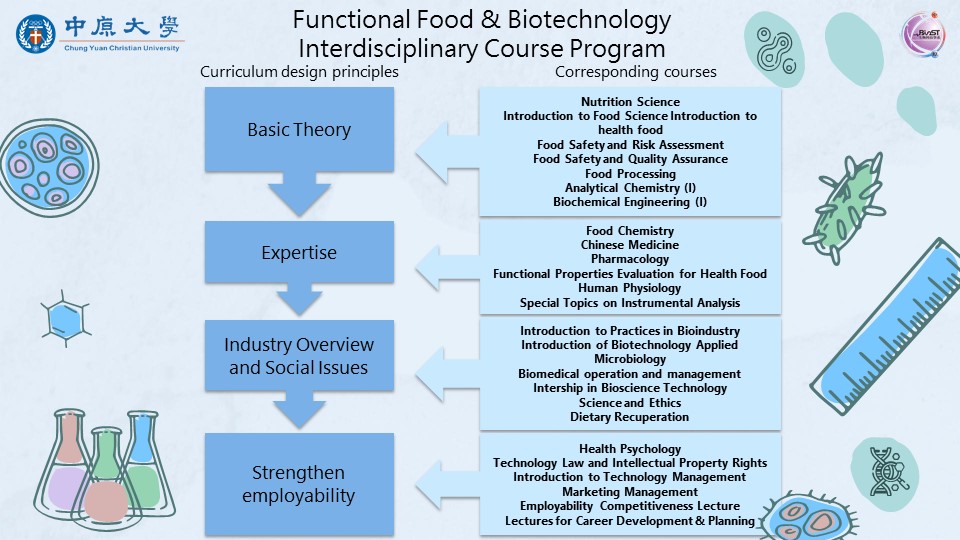Purpose
“Biotechnology and Health Food” is one of the most rapidly developing and commercially promising emerging fields in the global biotechnology industry today. It is an interdisciplinary science that integrates chemistry, biology, microbiology, biochemistry, nutrition, engineering, and business management. Its development requires not only biotechnology professionals but also talents from engineering, information technology, and business administration.
This program provides a series of interdisciplinary courses across multiple colleges, aiming to cultivate talented individuals with diverse expertise. Such training will contribute significantly to the development of Taiwan’s biotechnology and health food industry, as well as to students’ future employment, entrepreneurship, and innovation.
Curriculum Design Principles and Features
Health foods represent one of the most promising sectors in the biotechnology field. The curriculum of this program is structured around four key areas: fundamental knowledge, professional expertise, industry insights, and career competitiveness. The design follows a progressive approach—from understanding the basic functions of food to exploring food safety, the theoretical foundations of health food development, market trends in Taiwan, and the bioactive ingredients and functional claims of popular health foods. The program also integrates psychology to help students understand consumer behavior, thereby preparing them for future employment or entrepreneurship.
The required courses include Nutrition, Introduction to Food Science, Introduction to Health Foods, Food Safety Assessment, Food Safety and Quality Assurance, Food Processing, Analytical Chemistry, and Biochemical Engineering. These foundational courses ensure that students gain a comprehensive understanding of the health food framework.
Among them, Food Safety Assessment and Food Safety and Quality Assurance are signature courses of the program. Since food is essential for human survival—second only to oxygen and water—safety is a fundamental prerequisite before any substance can be developed as a food or health product. Courses on food safety assessment are rare in Taiwan due to the limited number of experts in toxicology. Dr. Ming-Wei Chao, whose research expertise is in toxicology, teaches Food Safety Assessment, providing students with unique insights not commonly available in other universities.
In response to growing food safety concerns, Food Safety and Quality Assurance was added, with instruction by professionals from the industry to help students develop a stronger foundation and competitiveness in the health food field. Because food safety testing involves specialized instruments, Instrumental Analysis is also included to enhance students’ technical competence.
To address the physiological aspects of health food efficacy, the elective courses include Food Chemistry, Traditional Chinese Medicine, Pharmacology, Health Food Evaluation, and Human Physiology. These courses cover topics such as the characteristics of functional ingredients, evaluation methods for health food functionality, and human physiological mechanisms.
Furthermore, to help students understand industry trends and social issues, elective courses such as Biotechnology Industry Practices, Introduction to Biotechnology, Applied Microbiology, Biomedical Management, Biotechnology Internship, Science and Ethics, and Dietary Therapy are offered. These courses encourage participation in research and development while familiarizing students with real-world industry operations.
Notably, Applied Microbiology is co-taught by senior industry professionals Dr. Jin-Chu Chen (Vice President of Grape King Bio Ltd.) and Dr. Sheng-Jie Hsu (Deputy Director of the Bioengineering Center, Grape King Bio Ltd.). Their practical experience in fungal fermentation provides students with industry-oriented knowledge and skills.
To further strengthen students’ employability, the program collaborates with the Department of Psychology to offer Health Psychology, and with the Department of Business Administration to offer Introduction to Technology Management, Technology Law and Intellectual Property Rights, and Marketing Management. Additionally, two general education courses—Career Competitiveness Seminar and Career Development Workshop—are included to prepare students for the job market.
In summary, this program offers a comprehensive curriculum that combines theoretical knowledge and practical training in health food science. Supported by the excellent faculty of the Department of Biotechnology and the Department of Psychology, along with collaboration from leading experts in the biotechnology and health food industry and off-campus internship opportunities, this program aims to help students develop a second area of expertise, meet the needs of society and industry, and become interdisciplinary professionals with diverse skills.

